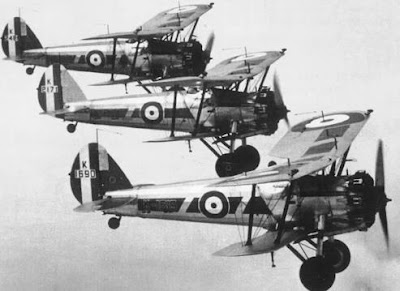The Bristol Bulldog was a single-engine fighter in service with the British RAF between 1929 and 1937. Officially known as the Type 105, this interwar period biplane was popular among the British pilots since it was a very reliable and rugged aircraft, with ease of handling. The Bristol Aeroplane Company built 450 aircraft, which would be phased out in 1937. The emergence of the first monoplanes forced the RAF to retire it. It was also used by the Royal Australian and the Finnish Air Force.
The Bristol Bulldog, Type 105, had been designed by Captain Frank S. Barnwell as a single-seat, interceptor fighter at a time when Great Britain had begun to radically transform the design and structure of their aircraft. This fast, maneuverable and compact fighter replaced the Gloster Gamecock and the Armstrong Whitworth biplanes, which were interceptors that had the role of attacking the slow bombers of the period.
Below, front view of the Bristol Bulldog IIA version. You can see the Jupiter VII, 9-cylinder, air-cooled, radial piston engine.
Technical Description
The Bristol Bulldog was a single-engine, single-seat biplane, whose upper plane had a wider span than the lower. Also, both wing planes had a dihedral upward angle of 5 degrees. The airframe consisted of stout metal tubes, with steel trips rivetted together. This frame was covered by hardened canvas. The two wing planes were joined by metal struts and wire.
Specifications (Bulldog IIIA)
Type: fighter
Length: 7.67 m (25 ft, 2 inch)
Wing Span: 10.31 m (33 ft, 10 inch)
Wing Area: 28.5 m2 (307 sq. ft)
Height: 2.67 m (8 ft, 9 inch)
Power Plant: one Bristol Mercury IV-A, 9-cylinder, radial piston engine, producing 485 horsepower.
Maximum Speed: 334.7 km/h (208 mph)
Service Ceiling: 8,900 m (29,300 ft)
Armament: two 7.7mm (.303-cal) Vickers machine guns. Four bombs.
Crew: one
Below, the Bristol Bulldog IIA variant, the most widely produced version, in flight in 1932. You can see the identification number K-2227.
A squadron of Type 105 fighters flying over England around 1930.
Below, the IIIA version, which rolled out of factory in October 1932.
The Bristol Bulldog II.




